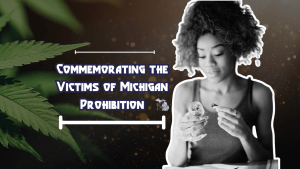Snack or Medicine? The Controversy of 'Jayden's Law' and Cannabis Edibles in Michigan Schools
Welcome to another deliciously informative post from your favorite team of cannabis connoisseurs.
Today, we’re swapping our chef hats for legal caps as we delve into something different – legislation.
Yes, you heard right! We’re talking about ‘Jayden’s Law’, a proposed bill that could add a new item to the school medicine menu: cannabis edibles.
Now, before you start imagining brownies and gummies at the lunch counter, let’s clarify what Jayden’s Law is about.
This proposed legislation isn’t about turning our schools into cannabis cafés. Instead, it aims to allow students with medical marijuana prescriptions to consume their medicine, specifically in the form of non-smokable edibles, while at school.
As of our last update, Jayden’s Law has been reintroduced in Michigan and is receiving support from passionate parents and lawmakers.
Michigan isn’t the first state to consider such legislation.
Shout-out to Colorado, Florida, Maine, New Jersey, and Washington, who have already passed similar laws.
These states are leading the way in recognizing that, for some students, cannabis isn’t just for fun and games—it’s necessary medicine.

So, there you have it! A quick overview of Jayden’s Law and its current status.
Stick around as we unpack this potential game-changer for the Michigan cannabis community.
Let’s dive deeper, shall we?
Understanding 'Jayden's Law'
‘Jayden’s Law’, named after Jayden Carter, a student who uses medical marijuana for epilepsy, proposes allowing students with valid medical cannabis prescriptions to use their medicine on school grounds.
The law aims to ensure that students like Jayden, who rely on medical cannabis to control their symptoms, can fully participate in their education without interruptions or discomfort. Importantly, the law specifies that the cannabis must be in a non-smokable form, primarily edibles but also tinctures and tablets.
Edibles are discreet and effective for medical cannabis patients and easily integrated into a school routine. This law reflects changing perceptions and acceptance of medical cannabis.
How 'Jayden's Law' could change cannabis rules in schools

If ‘Jayden’s Law’ is put into effect, it would bring about substantial changes to school policies regarding cannabis use.
Right now, schools have a strict no-drug policy, which includes cannabis, regardless of its medicinal purposes.
However, if the law is passed, schools would be required to make accommodations for students who are prescribed medical cannabis, allowing them to consume non-smoking cannabis products on school premises.
Existing school policies on medication
Most schools already have policies to manage prescribed medication use during school hours, typically requiring storage and administration by a school nurse.
‘Jayden’s Law’ could fit within these structures but would probably require additional guidelines to manage storage, distribution, and consumption.
Pros and cons of allowing edibles in schools
Allowing edibles in schools could drastically improve the quality of life for students relying on medical cannabis. They would no longer need to plan medication around school hours but instead take it as needed while continuing normal activities.
However, concerns exist about blurring lines between medical and recreational use and ensuring secure storage to prevent access by unintended students.
Careful planning and implementation are necessary to accommodate medical needs while maintaining a safe school environment.
Arguments For 'Jayden's Law'

Advocacy from Parents and Lawmakers
There’s significant support for ‘Jayden’s Law’ from parents and lawmakers. Parents of children who rely on medical cannabis argue that safe access to their prescribed medication during the school day is essential.
Lawmakers backing the legislation, like Representative Yousef Rabhi, echo these sentiments, stating that students shouldn’t have to choose between their health and education.
Benefits for Students with Medical Marijuana Prescriptions
From a student perspective, ‘Jayden’s Law’ could be a game-changer. For students who rely on medical cannabis, consuming their medication during the school day could prevent disruptive symptoms, reduce absences, and improve academic performance.
Moreover, these students wouldn’t have to miss crucial hours of the school day to take their medication at home. They could stay on campus, attend classes, and participate in school activities like their peers.

Case Studies or Anecdotes Supporting the Law
Numerous anecdotes and case studies support the law.
Take the law’s namesake, Jayden Carter, for example. Jayden’s mother, Amie Carter, has been vocal about the dramatic improvement in Jayden’s condition since starting medical cannabis.
Before cannabis, Jayden had up to 40 seizures a day. Today, with regular doses of medical cannabis, Jayden has fewer seizures and actively participates in school.
Arguments Against 'Jayden's Law'

Opposition from Educators, Health Professionals, or Stakeholders
Despite strong advocacy from parents and lawmakers, ‘Jayden’s Law’ has faced significant opposition from educators, health professionals, and some parent groups.
Educators express concerns about distinguishing medical use from recreational use, potentially leading to increased substance misuse under the guise of medical necessity. Health professionals raise questions about the long-term effects of cannabis use on developing brains.
Lastly, some parent groups worry about non-prescribed students’ exposure to cannabis, fearing it might trivialize the drug’s dangers and encourage recreational use.
Concerns about Student Health and School Environment
Opponents of ‘Jayden’s Law’ often cite student health and the school environment as their chief concerns.
They argue that even for medical purposes, the presence of cannabis could normalize its use and potentially increase recreational use among students.
There are also worries about accidental ingestion of edibles by non-prescribed students.
Furthermore, opponents question whether school staff would be adequately trained to administer cannabis-based medications, and if it would distract from their main educational duties.
Case Studies Opposing Jayden's Law
While the supporting anecdotes for ‘Jayden’s Law’ are powerful, there are also case studies that raise concerns.
For example, in Colorado, where medical cannabis in schools has been allowed since 2016, there have been reports of increased recreational use and non-prescribed students gaining access to cannabis.
Opponents of ‘Jayden’s Law’ cite these cases as potential indicators of challenges and unintended consequences that could arise if similar policies are implemented in Michigan.
The End of Cannabis-Free Schools in Michigan?

We have explored various aspects of ‘Jayden’s Law’ in this discussion, delving into the nuances of this proposed legislation.
The law aims to allow eligible students to use medical cannabis during school hours, potentially improving their quality of life.
Strong advocacy from parents and some lawmakers is fueled by compelling anecdotes, such as Jayden Carter’s transformative experience with medical cannabis.
However, opposition from educators, health professionals, and some parent groups is substantial, driven by concerns about distinguishing between medical and recreational use, the impact on the school environment, and the long-term effects on developing brains.
Currently, ‘Jayden’s Law’ is under review in the Michigan State Legislature. While the law has strong support, vocal opposition makes its passage uncertain. Lawmakers face the delicate task of weighing the potential benefits for students needing medical cannabis against the risks and implications for the larger student body.

As the debate over ‘Jayden’s Law’ continues, it is crucial to stay informed and engaged. This complex issue could have implications for student health, school policy, and broader attitudes towards cannabis.
Whether you are a parent, educator, student, or concerned citizen, consider how this law could impact your community and make your voice heard.
Stay updated, participate in discussions, and reach out to your local representative to share your thoughts.
The outcome of ‘Jayden’s Law’ will be shaped by those who engage in the dialogue.
















